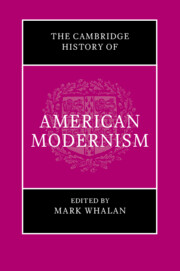Book contents
- The Cambridge History of American Modernism
- The Cambridge History of American Modernism
- Copyright page
- Contents
- Figures
- Contributors
- Acknowledgments
- Chronology
- Introduction
- Part I Methodologies
- Part II Forms, Genre, and Media
- 7 New Visual Media
- 8 Midwestern Modernism and the Radio
- 9 Modernist Writing and Painting
- 10 Modern Folk, Modernist Documentary
- 11 Skyscraper Organizations
- 12 The Jazz Age
- 13 Modernism’s Deep Roots
- 14 Modernizing the American Short Story
- 15 Modernist American Long Poems
- 16 The Modernist Lyric and Its Discontents
- 17 Anthologies
- 18 Fragile Realism
- 19 Post-World War II Theater and Media
- 20 The Limits of an American Modernist Avant-Garde
- 21 Magazines
- 22 The Modernist Presses
- 23 Literary Criticism
- 24 Libertad Bajo Palabra
- Part III Situating US Modernism
- Select Bibliography
- Index
12 - The Jazz Age
from Part II - Forms, Genre, and Media
Published online by Cambridge University Press: 13 July 2023
- The Cambridge History of American Modernism
- The Cambridge History of American Modernism
- Copyright page
- Contents
- Figures
- Contributors
- Acknowledgments
- Chronology
- Introduction
- Part I Methodologies
- Part II Forms, Genre, and Media
- 7 New Visual Media
- 8 Midwestern Modernism and the Radio
- 9 Modernist Writing and Painting
- 10 Modern Folk, Modernist Documentary
- 11 Skyscraper Organizations
- 12 The Jazz Age
- 13 Modernism’s Deep Roots
- 14 Modernizing the American Short Story
- 15 Modernist American Long Poems
- 16 The Modernist Lyric and Its Discontents
- 17 Anthologies
- 18 Fragile Realism
- 19 Post-World War II Theater and Media
- 20 The Limits of an American Modernist Avant-Garde
- 21 Magazines
- 22 The Modernist Presses
- 23 Literary Criticism
- 24 Libertad Bajo Palabra
- Part III Situating US Modernism
- Select Bibliography
- Index
Summary
Jazz is a music that did not merely inspire works of literature; in many cases it aspired toward the literary. Drawing from Ralph Ellison’s impulse to praise the jazz rhythms of T. S. Eliot’s The Waste Land (1922) as containing a “range of allusion [that] was as mixed and varied as that of Louis Armstrong,” this chapter offers an overview of the aesthetic, thematic, and political motivations of jazz and modernist literature from blues and ragtime to the emergence of bebop. In exploring jazz as one of the “forms” of American modernism, I attend to the experimental formal variations in the poetry and prose of a wide range of authors, including Sterling Brown, T. S. Eliot, F. Scott Fitzgerald, Langston Hughes, Zora Neale Hurston, Claude McKay, Jean Toomer, William Carlos Williams, and others, but also to the radical form of the blues by Louis Armstrong, W. C. Handy, and Bessie Smith.
- Type
- Chapter
- Information
- The Cambridge History of American Modernism , pp. 222 - 236Publisher: Cambridge University PressPrint publication year: 2023



